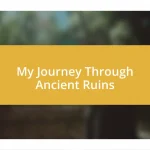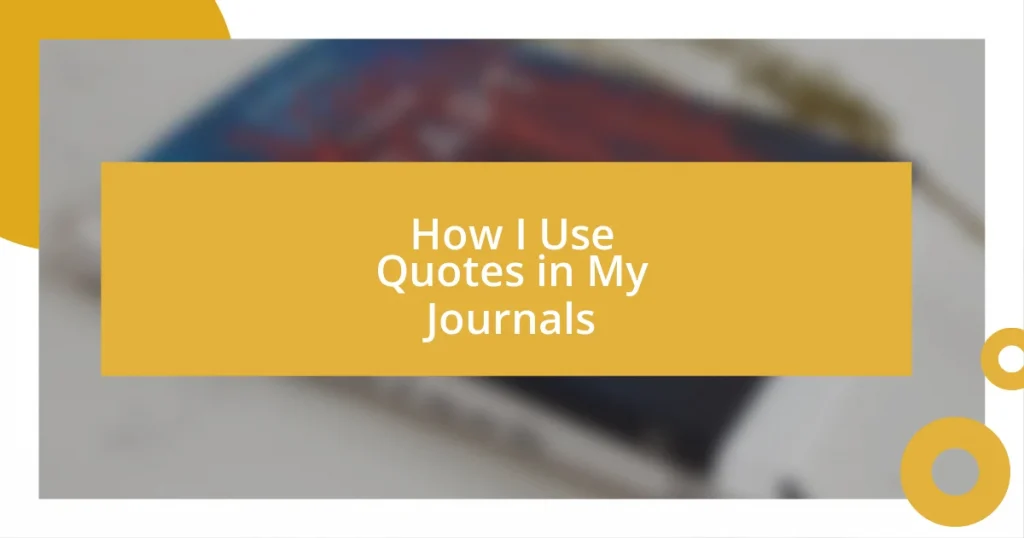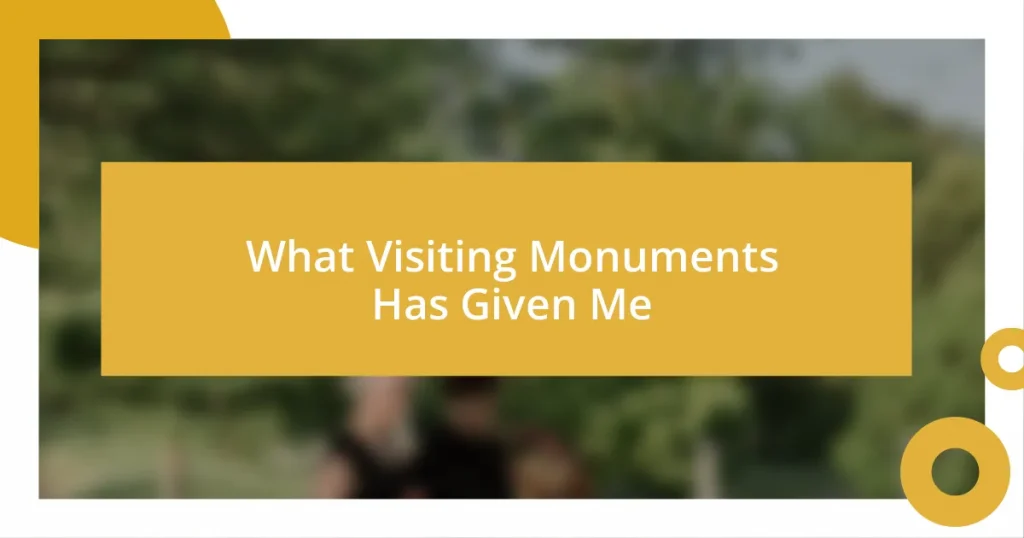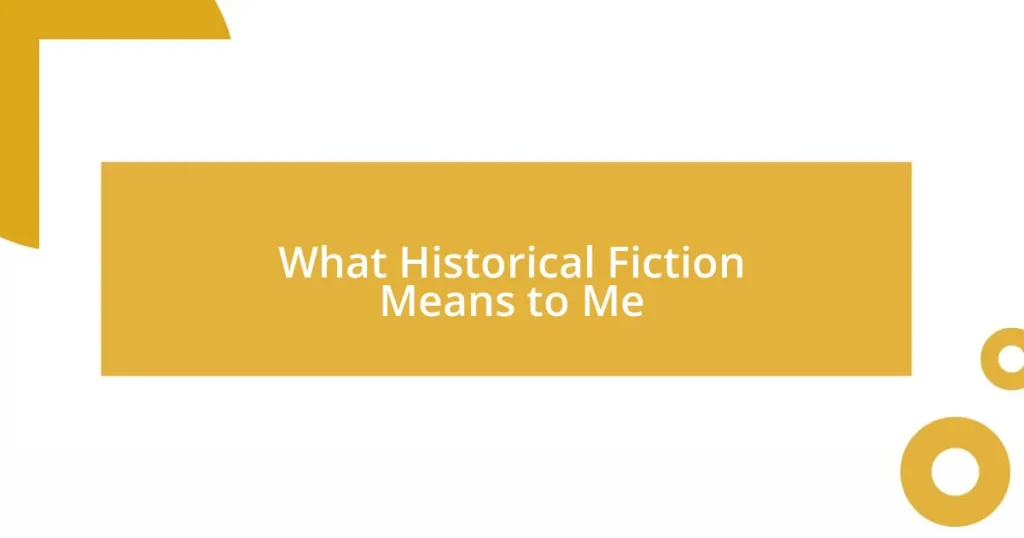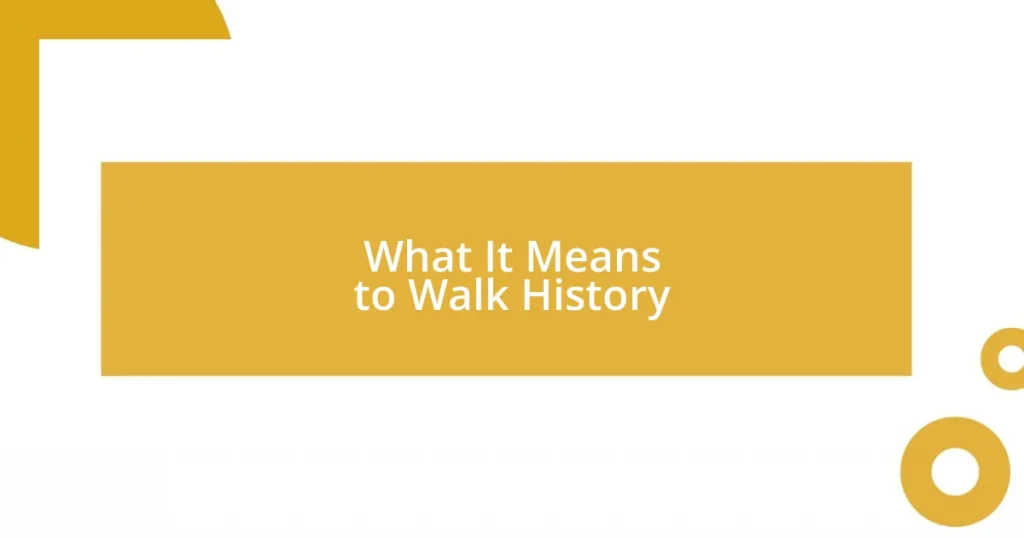Key takeaways:
- Quotes enrich journaling by providing motivation, reflection, and a connection to personal experiences and aspirations.
- Selecting meaningful quotes involves considering their personal relevance, emotional impact, timelessness, and contextual fit.
- Sharing quotes within a community fosters collective reflection and deeper discussions, enhancing understanding and connections among individuals.
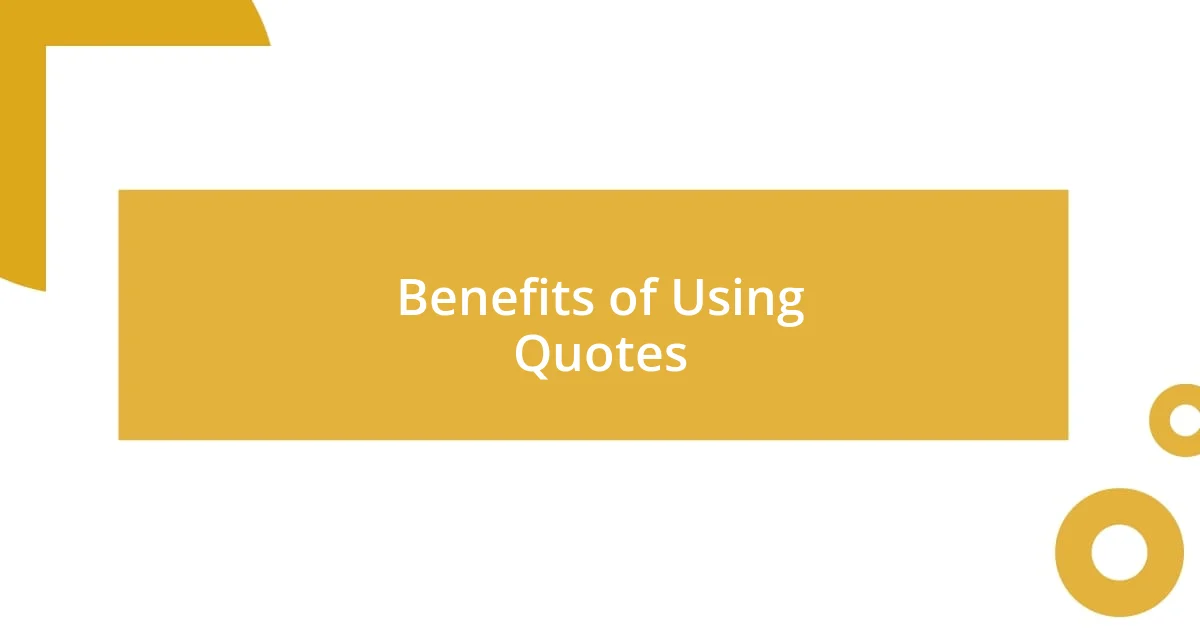
Benefits of Using Quotes
Using quotes in my journals has profoundly enriched my writing and provided a reflective space for deeper thoughts. I often find a quote that resonates with my feelings at a certain moment, like when I stumbled upon a line by Maya Angelou that perfectly captured a struggle I was facing. It’s as if those words were crafted just for me, reminding me that I’m not alone in my experiences.
Moreover, quotes inspire motivation and clarity. When I’m feeling overwhelmed, I turn to my collection of quotes and often discover a single line that reignites my passion. I remember writing about a tough day when I found the phrase, “This too shall pass.” The simplicity of those words offered me comfort and helped me refocus my perspective.
Quotes also serve as meaningful touchstones that connect me to larger ideas and wisdom. When I jot down a quote that speaks to my values, it becomes a part of my ongoing narrative. I sometimes ask myself why certain quotes stand out to me, and I realize it’s because they resonate with my journey and aspirations. This personal connection transforms my journaling process into a dialogue with my past experiences and future dreams.
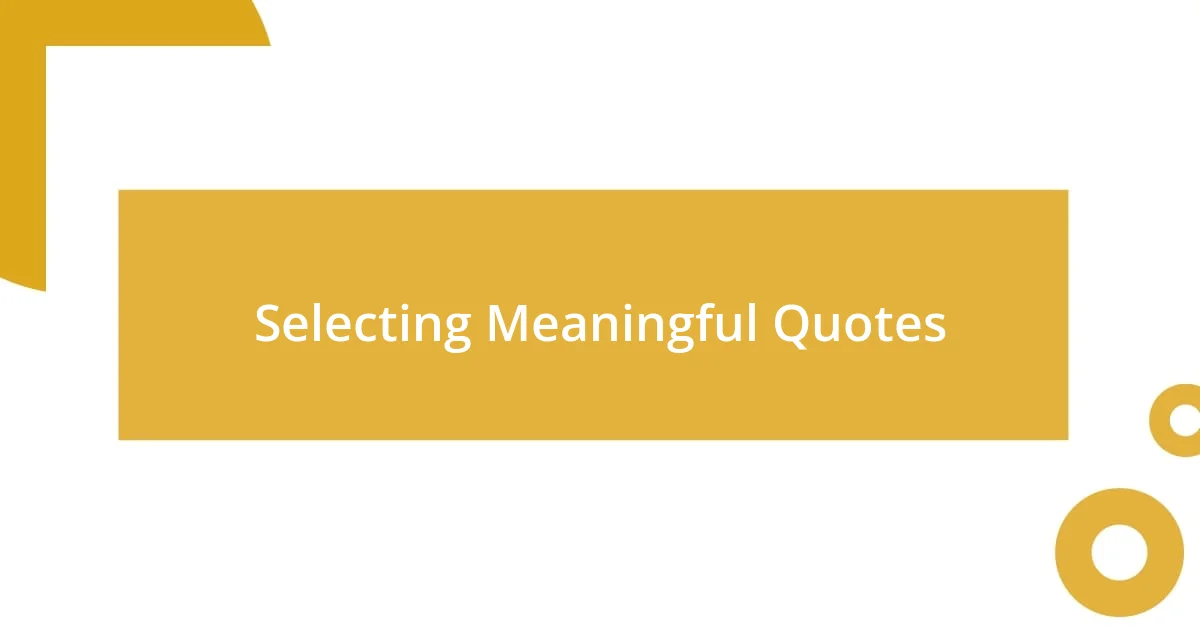
Selecting Meaningful Quotes
When selecting meaningful quotes, I often look for words that provoke thought and stir emotions. I remember a particular instance when I came across a quote by Rumi that said, “The wound is the place where the Light enters you.” That quote enveloped me in a sense of healing; it was as if I had found a balm for my struggles. It reminded me that even in pain, there’s a transformative light waiting to emerge.
To choose quotes that resonate, I consider the following:
- Personal Relevance: Does it relate to my current feelings or experiences?
- Emotional Impact: Does it evoke strong feelings or memories?
- Timelessness: Does it impart wisdom that remains valuable over time?
- Contextual Fit: Does it seamlessly integrate into the theme of my journaling session?
By focusing on these factors, I can curate a collection of quotes that genuinely reflect my journey, creating a deeper connection to the words and their meanings.
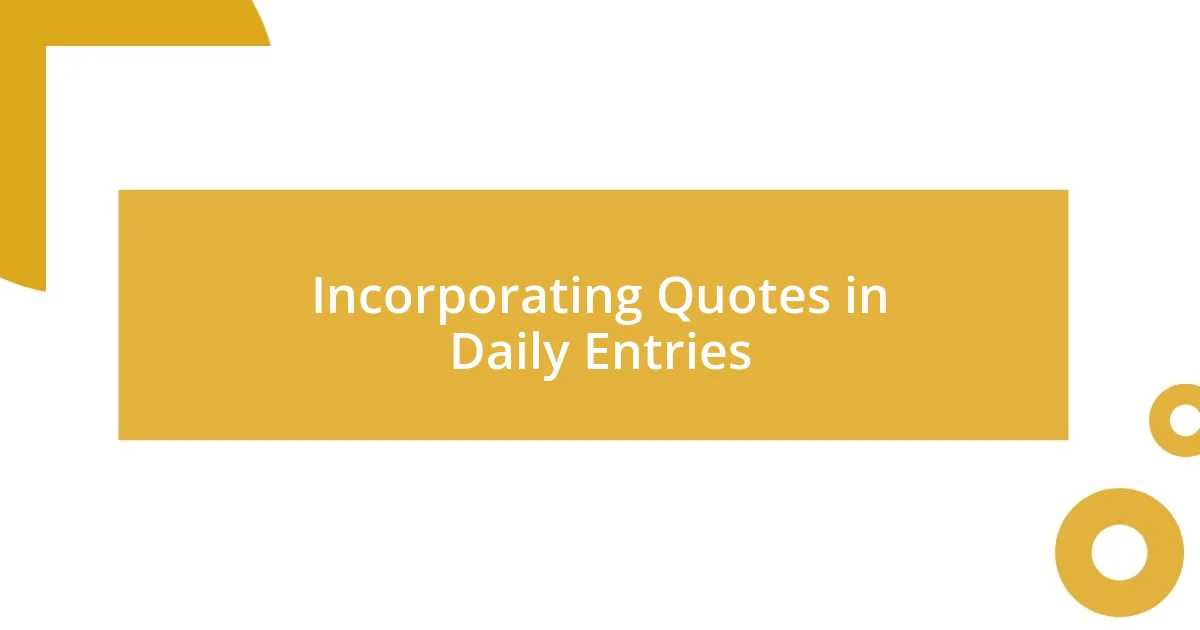
Incorporating Quotes in Daily Entries
Incorporating quotes in my daily journal entries adds a layer of reflection that I find invaluable. I often start my entry by jotting down a quote that resonates with my mood that day. For instance, on an especially challenging morning, I wrote down, “You are not a drop in the ocean. You are the entire ocean in a drop,” by Rumi. This quote reminded me of the vast potential within me and transformed my mindset, setting a positive tone for the day ahead.
I’ve noticed that the way I weave quotes into my entries can shape my thoughts and prompt deeper insights. Sometimes, I’ll choose a quote that challenges my perspective, inviting me to explore my feelings. For example, I once included a line by Nelson Mandela that said, “It always seems impossible until it’s done.” Reflecting on that made me confront my fears about a daunting project at work, encouraging me to break it down into manageable steps.
The beauty of incorporating quotes lies in their ability to evoke emotions and spur contemplation. I remember writing an entry where I paired a thought about gratitude with a quote from Oprah Winfrey: “Be thankful for what you have; you’ll end up having more.” This connection turned my entry into a gratitude list, highlighting the positive aspects of my life in that moment, a practice that significantly uplifted my spirit.
| Quote Type | Example |
|---|---|
| Inspirational | “You are not a drop in the ocean. You are the entire ocean in a drop.” – Rumi |
| Challenging | “It always seems impossible until it’s done.” – Nelson Mandela |
| Gratitude | “Be thankful for what you have; you’ll end up having more.” – Oprah Winfrey |
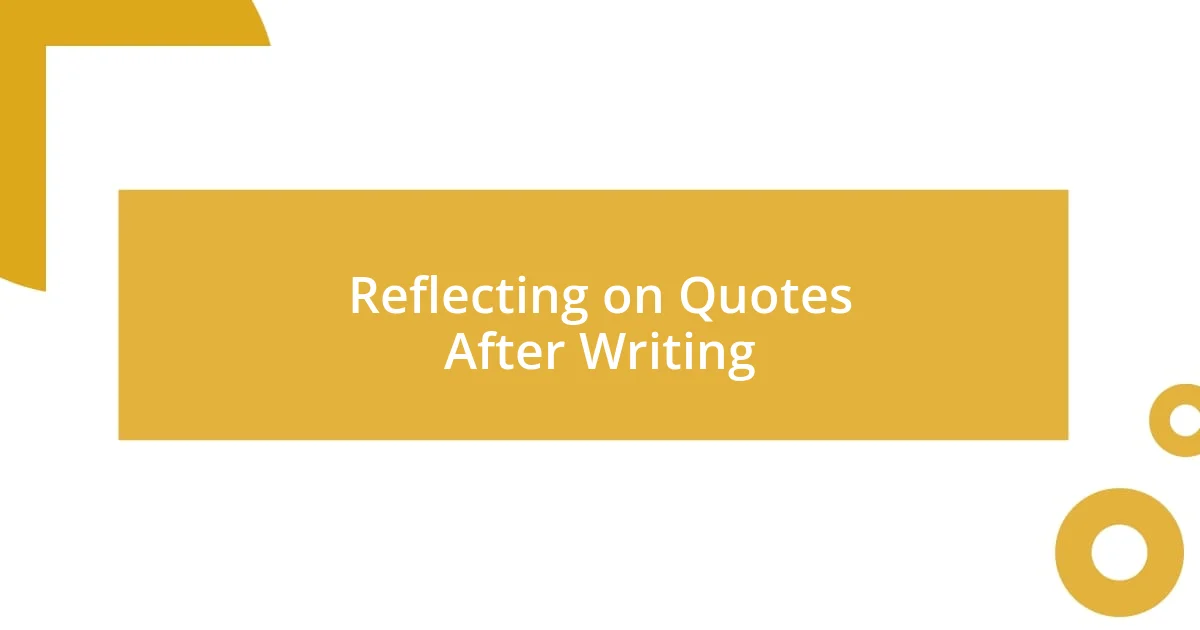
Reflecting on Quotes After Writing
Reflecting on quotes after writing in my journal feels like a moment of personal revelation. I often pause to consider how the chosen words resonate with my experiences. For instance, after writing about a recent disappointment, I revisited the quote, “Do not be afraid to be the woman who is not afraid to stand for herself.” It prompted me to evaluate not only my feelings but also my strength in confronting challenges.
I’ve found that these reflections can stir powerful emotions. After incorporating a quote that speaks to perseverance, I might realize how much I’ve grown through adversity. One evening, I used a quote by Maya Angelou, “I can be changed by what happens to me, but I refuse to be reduced by it.” Reflecting on this made me appreciate the bumps I’ve overcome and sparked a renewed commitment to my goals.
Sometimes, reflecting on quotes leads me to formidable questions. What do they reveal about my journey? For instance, when I engaged with a quote from Albert Einstein about imagination, I found myself contemplating what I envision for my future. It’s a way to connect deeper with my aspirations, turning mere words into a mirror reflecting my path forward.
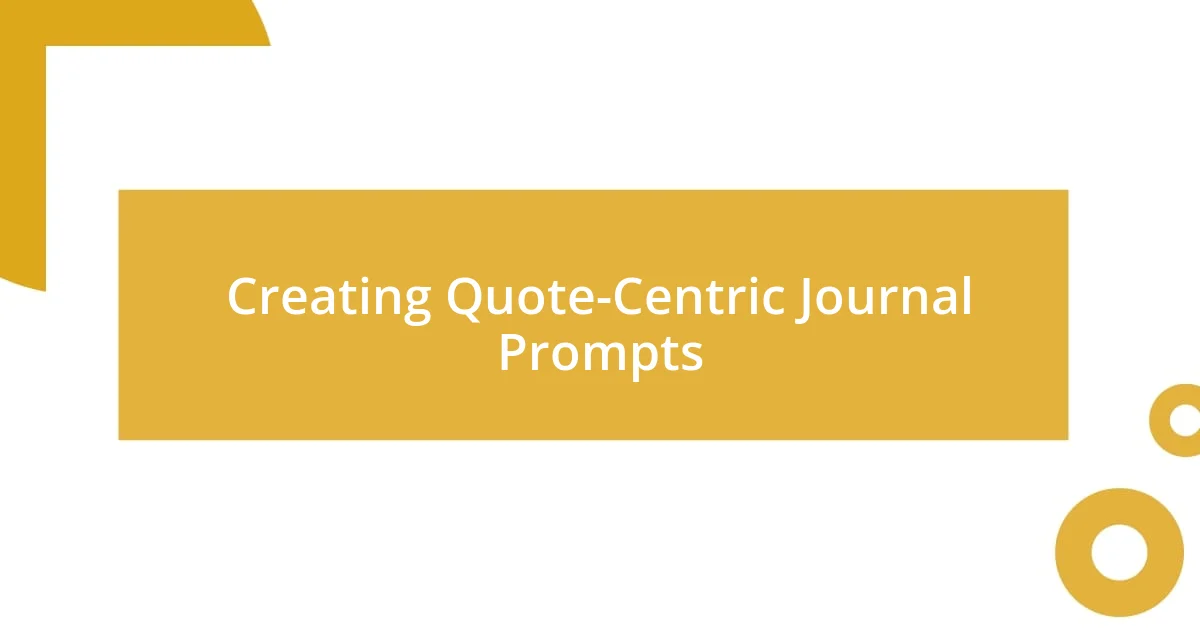
Creating Quote-Centric Journal Prompts
Creating quote-centric journal prompts can truly redefine the way we engage with our thoughts. I often pick quotes that resonate deeply with me, and then I formulate prompts that challenge me to delve into those ideas further. For example, after choosing a quote about resilience, I might ask myself, “In what situations have I shown resilience this week?” This not only stimulates reflection but also nudges me toward personal growth.
When I craft these prompts, I aim to evoke emotions that can lead to deeper insights. I remember once taking a quote by Brene Brown—“Vulnerability is the birthplace of innovation, creativity, and change”—and using it to spark a prompt. I asked myself, “What am I afraid to express, and how might that fear be holding me back?” The answer wasn’t just enlightening; it also paved the way for a meaningful shift in my life.
It’s fascinating how a single quote can ignite a stream of thoughts. For instance, I often use George Eliot’s words, “It’s never too late to be what you might have been,” as a prompt to explore my unpursued dreams. Reflecting on that not only reminds me of what I’ve set aside but also ignites a spark of motivation to revisit those aspirations. What dreams are you holding back on? This question can lead to an empowering journaling session filled with clarity about taking action.
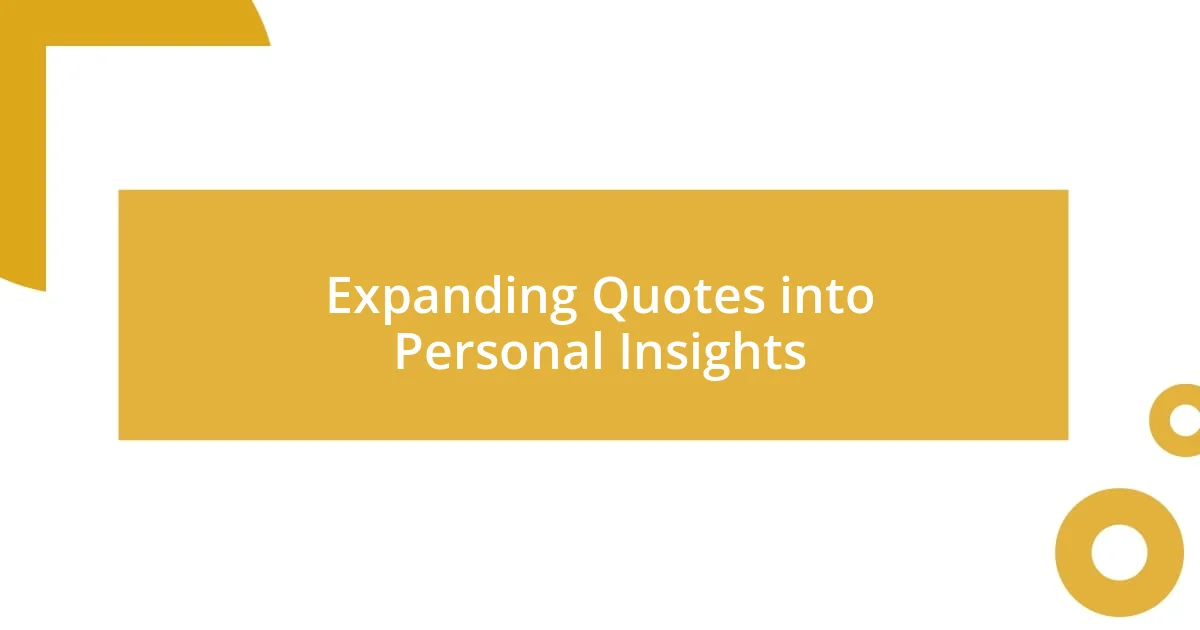
Expanding Quotes into Personal Insights
Expanding a quote into personal insights can feel like uncovering hidden layers of my own experiences. Recently, I reflected on a powerful quote by Rumi: “The wound is the place where the Light enters you.” This made me think about my struggles and how each challenge became an opportunity for growth. I realized that my past disappointments weren’t just painful; they were catalysts that shaped my resilience and wisdom.
There are moments when a quote sparks a deep emotional unveiling. I remember pondering a quote by Nelson Mandela, “I never lose. I either win or learn.” This reflection struck a chord with me during a difficult career transition. Rather than dwelling on what felt like failure, I embraced the lessons I gained along the way. I found myself appreciating the insights about myself that emerged from this phase, transforming what initially felt like defeat into a journey of enlightenment.
Engaging with quotes often leads me to poignant questions that challenge my perspective. When I encountered a quote from Viktor Frankl—“When we are no longer able to change a situation, we are challenged to change ourselves”—I couldn’t help but reflect on my reactions to life’s unpredictability. What if the path forward requires more than just resilience? What if it demands introspection? These types of inquiries enrich my journaling experience, inviting me to explore how I can adapt and thrive in the face of adversity.
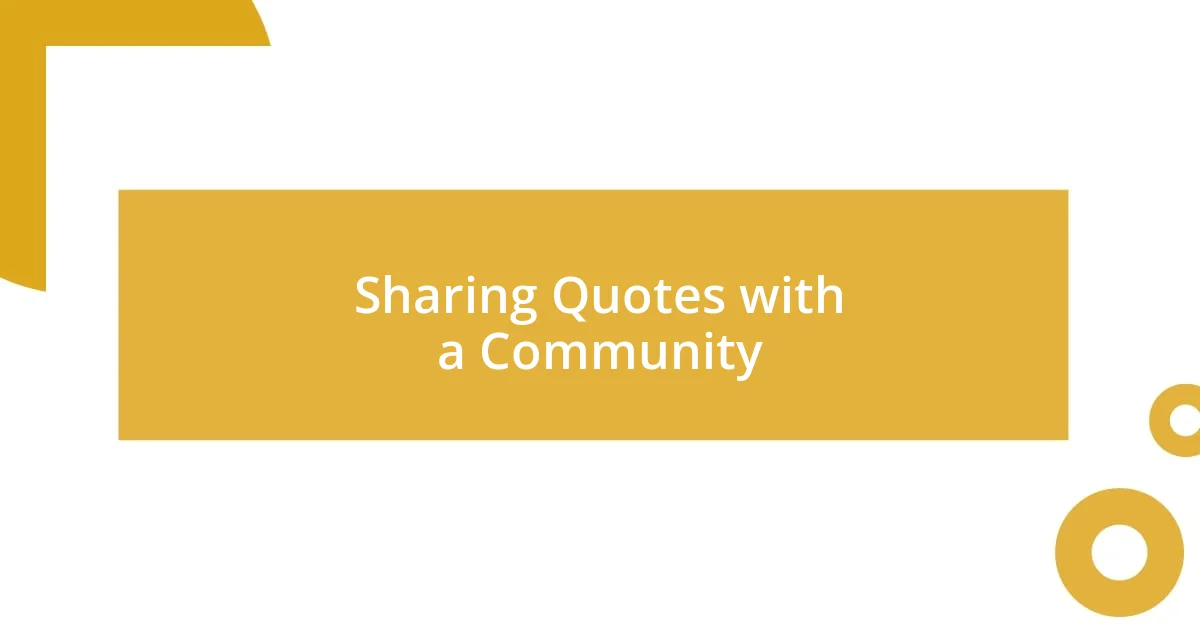
Sharing Quotes with a Community
Sharing quotes with a community creates a unique opportunity for collective reflection. I often post a thought-provoking quote on social media and ask my friends how it resonates with them. The responses can be surprising! Once, I shared a quote about self-love, and it sparked a heartfelt conversation about our struggles with self-acceptance. Hearing others’ stories not only deepened our bond, but it also broadened my understanding of the quote itself.
In community settings, quotes can act as a catalyst for deeper discussions. I remember attending a book club where we centered our conversation around a quote from Maya Angelou: “I’ve learned that people will forget what you said, people will forget what you did, but people will never forget how you made them feel.” This quote prompted a rich dialogue about empathy and connection. It made me realize that our feelings about others often linger longer than the details of our interactions. Have you ever reflected on how your words impact those around you?
Sharing quotes in a group often leads to unexpected insights. When my writing group discussed a quote by Albert Camus, “In the midst of winter, I found there was, within me, an invincible summer,” we each shared experiences of overcoming personal hardships. It was magical to witness the warmth and understanding as we connected through those shared tales of resilience. What quotes have sparked similar reflections in your own community? This exchange not only strengthens our relationships but also highlights the universal themes in our experiences.






